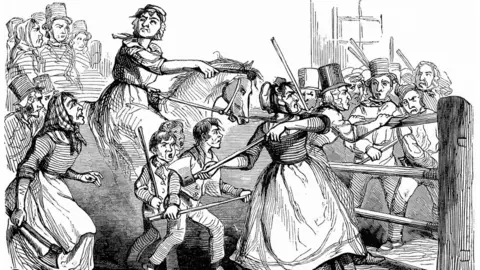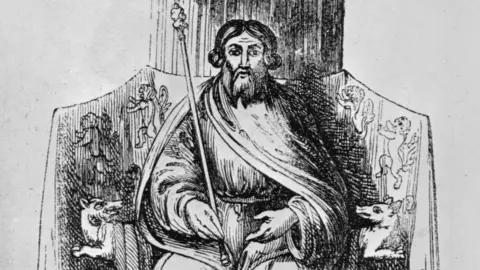History: Children 'must learn Wales' story' in school
"Must-have" historical topics should be taught so Welsh school pupils know "our national story", a report has said.
A Welsh assembly committee heard there could be inconsistency unless there was more specific guidance under the new curriculum, which begins in 2022.
In particular, they warned there was a risk the history of ethnic minorities could be overlooked.
The Welsh Government said there would be guidance and resources on key historical events and topics.
The culture committee said the new curriculum could allow for greater scope to teach Welsh history, but there should be clear guidance on what should be included.
It also said a review of current Welsh history teaching was needed in order to understand how it should be delivered when the curriculum changes.
During an inquiry, the committee heard Welsh history teaching was "patchy" and varied between schools.
 Getty Images
Getty ImagesHow will history be taught?
Under the new system, it will be taught within humanities - one of six broad "areas of learning" replacing narrow subjects.
The draft curriculum, due to be finalised in January, emphasises the importance of the Welsh dimension and said children should develop a sense of identity as well as "an understanding of Wales and its place in the wider world".
However, it does not list specific topics, reflecting the overall approach in the curriculum which sets out a framework and purpose, giving flexibility for teachers to decide the detailed content.
The new curriculum will be introduced in primary schools and Year 7 in 2022 and rolled out as these pupils move up. Children currently in Year 4 or below will be taught under the new system.
 BBC (Ben Salter)
BBC (Ben Salter)What do historians, campaigners and teachers think?
Uzo Iwobi, from Race Council Cymru, told the committee black history in Wales must not be optional. She said leaving this decision to teachers and schools was "not good enough".
The historical group Owain Glyndwr Society said pupils might end up learning about their area but not about significant historical developments in other parts of Wales.
"The new curriculum should have a list of must-haves, i.e. topics that all the pupils in the country need to be taught," it said.
Among those who gave evidence was Dyfodol i'r Iaith, a campaign organisation set up in 2012 to promote the Welsh language by influencing policy content and exploring new ideas.
It said a balance could be struck between prescribing the most significant events all pupils should know and teachers' professional freedom.
Representatives of teaching unions agreed that, although it might go against the spirit of the new curriculum, "guidelines need to be given".
A report in 2013 made recommendations to boost the Welsh aspect in history teaching, but its author Dr Elin Jones told the committee she had "no confidence" the new curriculum would lead to improvements without clear guidance and examples of good practice.
She said there were "certain key periods in Welsh history that are central to the formation of an individual identity in Wales".
 Getty Images
Getty ImagesWhat has the committee called for?
Assembly members said: "If the new curriculum is being described as a vision for Wales, then it is necessary for all pupils to learn a common set of topics and events which have shaped the nation in which they grew up."
They called for suitable teaching materials and the right training for teachers to include the history of Wales' racial and religious diversity.
A Welsh Government spokesman said: "Learning about the history of our nation will be central to the curriculum's areas of learning and experience, so that young people are engaged in rich learning experiences about the histories, geography and cultures of Wales."
He added the flexibility of new curriculum would allow teachers to deliver these lessons "in more creative ways better suited to the learners they teach".
